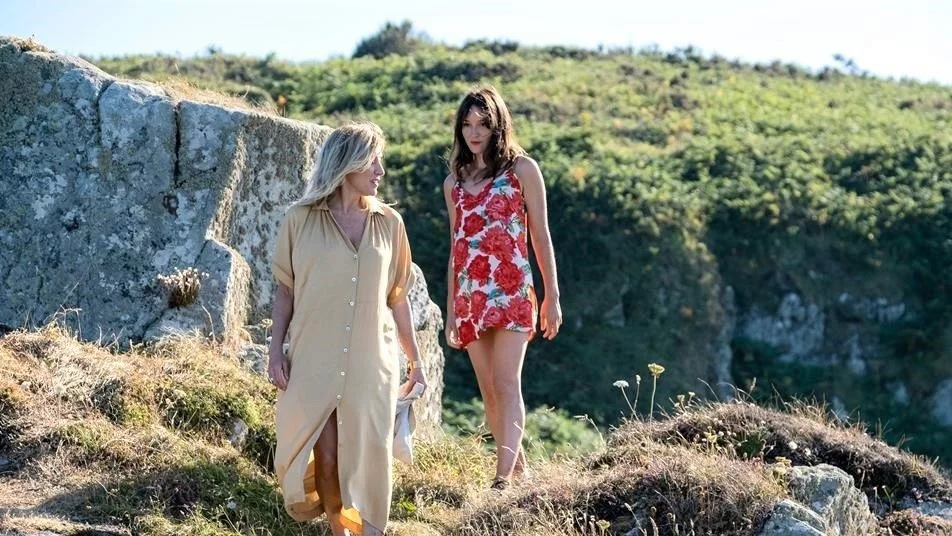Anaïs in Love
Anaïs Demoustier is on appealing form in Charline Bourgeois-Tacquet’s romantic comedy-drama.
In this her first feature the French writer-director Charline Bourgeois-Tacquet takes not one gamble but several. The first one relates to the titular character, 30-year-old Anaïs for she is somebody who rarely stops talking, runs almost everywhere to make up for being late and is accident-prone into the bargain. These are characteristics that if encountered in real life might well make the person in question an irritating figure to be avoided. Hoping that Anaïs as an on-screen figure will entertain, Bourgeois-Tacquet pulls it off initially, first because Anaïs is played by the appealing Anaïs Demoustier and secondly because this film sets out as a comedy. It helps too that Noé Bach’s colour photography makes good use of locations which range from Paris to the French countryside. Furthermore, the filmmaker has a good ear for music and finds the ideal piece to accompany Anaïs when we see her constantly on the move - it’s ‘Les Tourbillons’ by the 18th century composer Louis-Claude Daquin.
Music is again important when a sudden change of mood is required. When it transpires that the mother of Anais (Anne Canovas) is suffering a serious relapse following an earlier cancer alarm ‘Dido's Lament’ from Purcell’s Dido and Aeneas helps to express the distress felt by Anaïs. But for most of the time the tone of the film’s first half is light as Anaïs moves on from her former partner (Christophe Montenez) to an affair with an older man which again leaves her dissatisfied. This man is Daniel (Denis Podelydès), a publisher, but the inability of Anaïs to find the right relationship fails to arouse any sympathy, and all the more so because she is so self-centred and lacking in concern for the feelings of others (there are echoes here of the central character in 2021’s The Worst Person in the World but that person’s inability to decide on what she wanted to do with her life was portrayed with more depth than is the case here and with more insight).
Since Anaïs in Love will doubtless be marketed as a lesbian love story, it seems appropriate to disclose here that, when Anaïs does find a love that seems able to transform her life, it is with Emilie (Valeria Bruni Tadeschi). Emilie is a novelist and, despite the sexual rapport that unites these two women, she is in fact the wife of Daniel. Having admired one of Emilie's novels, Anaïs has deliberately tracked her down to a retreat for writers and, when Daniel unexpectedly arrives there and discovers his mistress hanging out with his wife, he declares "This is not a movie, you know". That’s patently a comic line but, even though some of the writing here seems rather slipshod in its detail, once Anaïs in Love has become a love story it turns into what is essentially a serious drama.
Switching the tone in this way is the second gamble inherent in this project. Such a change is always difficult to bring off (The Worst Person in the World also attempted it with less than complete success). In this particular case what happens is that so long as the film remains a comedy, we can minimise those aspects of how Anaïs behaves that render her unappealing, but once the tone changes, we realise that we feel too distant from her to care about the outcome of the relationship that she has with Emilie. This seriously undercuts the effectiveness of the film despite the fact that the performances by both Demoustier and Bruni Tedeschi are well-judged.
There's a third gamble here too. Despite the film having the character of a light-weight entertainment, references are made to Marguerite Duras and to Alain Robbe-Grillet as well as to the work of the film director John Cassavetes. However, one simply treats this as a sign that French cinema likes to flourish such names even in a popular work. But then another reference is made which cannot be regarded simply in that light. Emilie talks of adapting an opera into a stage play and the work in question is Der Rosenkavalier. When the final scenes of this film carry an echo of that opera it feels that a comparison is being invited. But, unfortunately, that only serves to emphasise that ultimately this is a film that doesn't want to attempt anything too serious despite paving the way for that.
We are left with what is overall an uneven piece, albeit one not without some pleasures. If the acting can be relied on, so can the choice of pre-existing music to go with a reliable film score from Nicola Piovani: not only is Charline Bourgeois-Tacquet rightly keen on Kim Carnes singing ‘Bette Davis Eyes’ but she also recognises the erotic appeal of Ravel’s ‘Introduction and Allegro for Harp and Strings’!
Original title: Les amours d’Anaïs.
MANSEL STIMPSON
Cast: Anaïs Demoustier, Valeria Bruni Tadeschi, Denis Podelydès, Xavier Guelfi, Christophe Montenez, Anne Canovas, Bruno Todeschini, Jean-Charles Clichet, Annie Mercier, Grégoire Oestermann, Marie-Arnelle Deguy.
Dir Charline Bourgeois-Tacquet, Pro Igor Auzépy, Stéphanie Demoustier, Philippe Martin and David Thion, Screenplay Charline Bourgeois-Tacquet, Ph Noé Bach, Pro Des Pascale Consigny, Ed Chantal Hymans, Music Nicola Piovani, Costumes Léa Forest.
Année Zero/Les Films Pelléas/Arte France Cinema/Canal+/Ciné+-Peccadillo Pictures.
98 mins. France. 2022. US Rel: 29 April 2022. UK Rel: (in cinemas and digital) 19 August 2022. Cert. 15.


